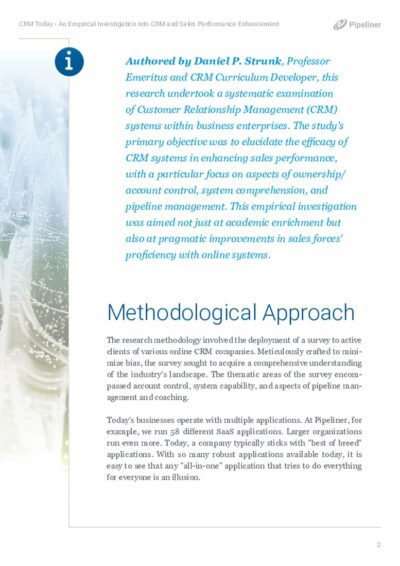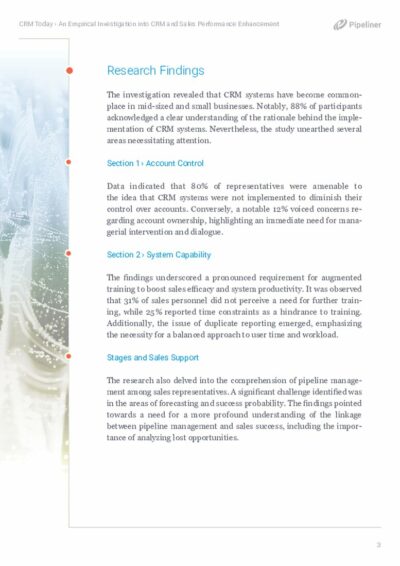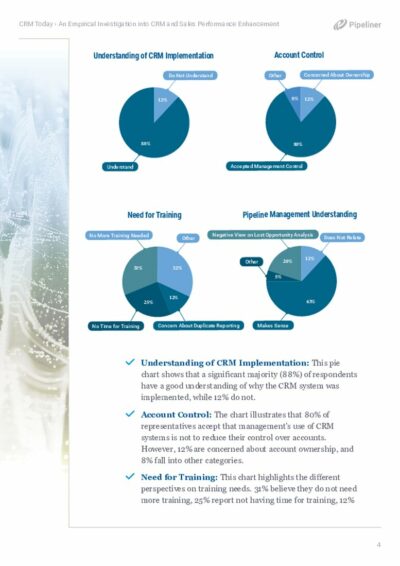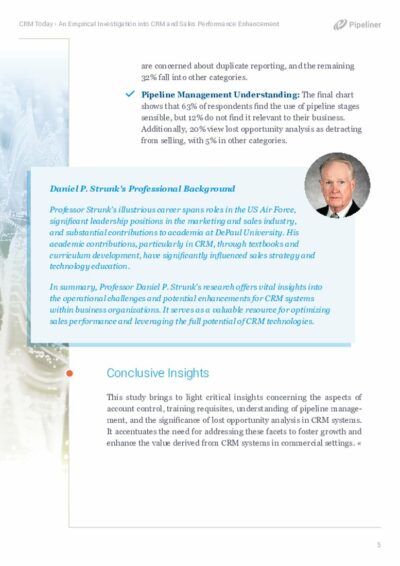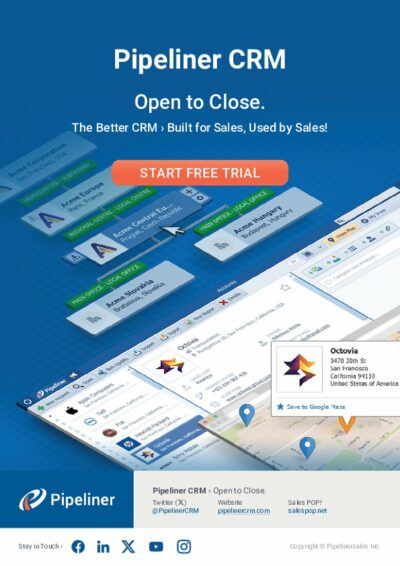
Authored by Daniel P. Strunk, Professor Emeritus and CRM Curriculum Developer, this research undertook a systematic examination of CustomerCustomer Customer is an individual or an organization that purchases a product or signs up for a service offered by a business. Relationship Management (CRM) systems within business enterprises. The study’s primary objective was to elucidate the efficacy of CRM systems in enhancing sales performance, with a particular focus on aspects of ownership/accountAccount Account refers to a record of primary and background information about an individual or corporate customer, including contact data, preferred services, and transactions with your company. control, system comprehension, and pipelinePipeline Sales pipelineis a visual representation of the stage prospects are in the sales process. management. This empirical investigation was aimed not just at academic enrichmentEnrichment Enrichment means the act or process of upgrading the value or improving the quality of something (such as a product, service or function) that induces the target beneficiary (customers, employees, etc.) to have a better experience, or derive a deeper meaning, connection and attachment to the product or function. but also at pragmatic improvements in sales forces’ proficiency with online systems.
Methodological Approach:
The research methodology involved the deployment of a survey to active clients of various online CRM companies. Meticulously crafted to minimize bias, the survey sought to acquire a comprehensive understanding of the industry’s landscape. The thematic areas of the survey encompassed account control, system capability, and aspects of pipeline management and coaching.
Research Findings:
The investigation revealed that CRM systems have become commonplace in mid-sized and small businesses. Notably, 88% of participants acknowledged a clear understanding of the rationale behind the implementation of CRM systems. Nevertheless, the study unearthed several areas necessitating attention.
Section 1 – Account Control:
DataData Data is a set of quantitative and qualitative facts that can be used as reference or inputs for computations, analyses, descriptions, predictions, reasoning and planning. indicated that 80% of representatives were amenable to the idea that CRM systems were not implemented to diminish their control over accounts.
Section 2 – System Capability:
The findings underscored a pronounced requirement for augmented training to boost sales efficacy and system productivity.
Daniel P. Strunk’s Professional Background:
Professor Strunk’s illustrious career spans roles in the US Air Force, significant leadership positions in the marketingMarketing Marketing is the field, set of actions, or practice of making a product or service desirable to a target consumer segment, with the ultimate aim of effecting a purchase. and sales industry, and substantial contributions to academia at DePaul University. His academic contributions, particularly in CRM, through textbooks and curriculum development, have significantly influenced sales strategy and technology education.
Learn More About Pipeliner CRM
Take a no-obligation 14 day trial of Pipeliner CRM.
No credit card info required – just experience for yourself how it could impact your sales.
Additional Resources
This ebook is on the subject of “Win Together.” It falls under the same context as“win-to-win” described in my book Network Selling: Guarantee Success for the Digital Age. Today, this aspect of sales is more important than ever, and must also be part and parcel of CRM solutions.
“For some years I’ve been saying that, as a society, we’re in the midst of a transformation. Given what’s happened in the last couple of years, there’s no one left who is disagreeing with me! It’s become very obvious.”
 Nikolaus Kimla, CEO at Pipelinersales, Inc.
Nikolaus Kimla, CEO at Pipelinersales, Inc.A common term in sales today is EQ, which stands for “emotional I.Q.” It means the skill a salesperson has in reading emotions and utilizing them in sales. It means empathy and a number of other abilities. The short version is, it’s an I.Q. when it comes to emotions. But just as with our Network Selling model, E.Q. isn’t just for sales, either. It’s actually the missing factor in human interactions, for confrontation—a common “tool” in human interactions—doesn’t actually handle anything.
“You can have everything in life you want if you will just help enough other people get what they want.”
 Zig Ziglar
Zig Ziglar

